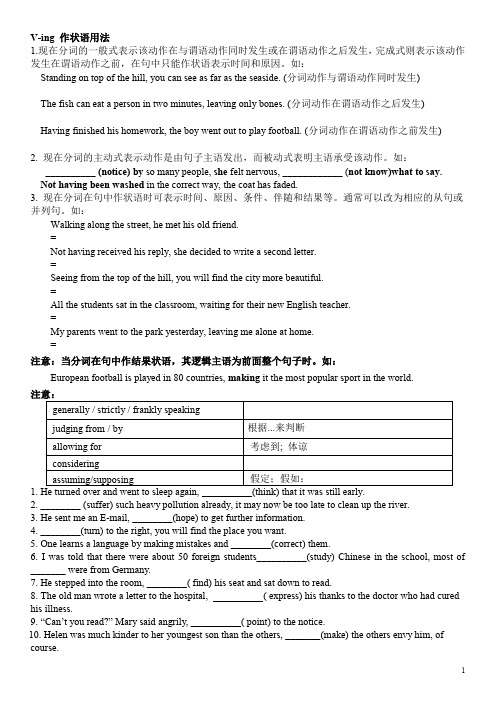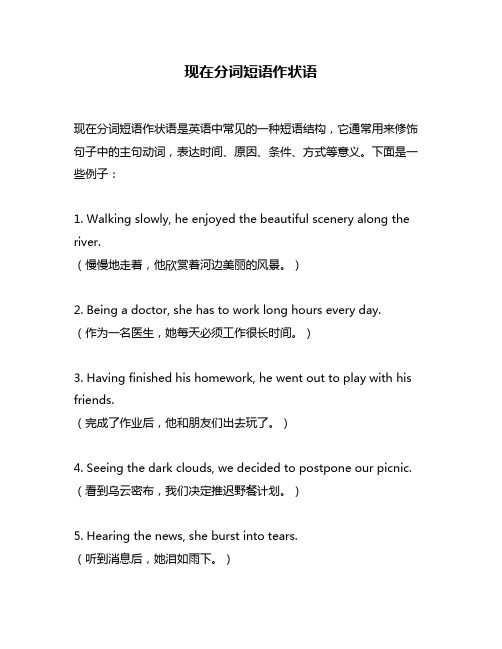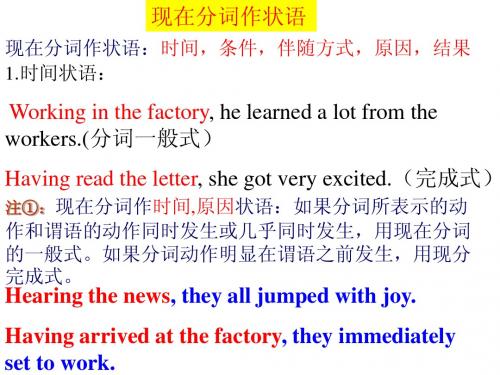现在分词作状语
现在分词作状语

作让步状语
• 分词短语在句中作让步状语时,相当于一个让步 状语从句,有时分词前可以带有连接词although, whether, even if, even though。 • 现在分词短语作让步状语,分词的逻辑主语是句 中的主语,变成状语从句时,需用主动语态。 • Weighing almost one hundred jin the stone was moved by him alone. • = Although the stone weighted almost one hundred jin, it was moved by him alone. 虽然那 块石头重将近一百斤,他一个人就把它挪动了。
独立主格结构作状语
• . 现在分词的独立主格结构作状语。例如: ① With his lips still trembling, he couldn't say a word. • ②“ Mama! ” he cried suddenly, tears rolling down his cheeks. “妈妈!”他突然哭着喊,泪 水从他的脸上流下来。(这里需要用现在分词的 独立主格结构 tears rolling down his cheeks 作状 语。) ③ Weather permitting, we'll go to the Great wall. 如果天气允许的话,我们就去长 城。(这里需要用现在分词的独立主格结构 Weather permitting 作状语。)
起补充说明作用
• 现在分词短语起补充说明的作用与伴随状语有些相似,但 严格地说,它不是伴随状语,因为它所表达的情景不与句 子的动作相伴而产生,实际上,它起着补充说明的作用, 相当于一个并列分句,但比分句简洁、明快。例如: ①My train leaves at six,arriving in Chicago at ten. =...and will arrive in Chicago at ten. ②The visiting Minister expressed his satisfaction with the talks,adding that he had enjoyed his stay here.=...and added that he had enjoyed his stay here.
现在分词做状语

5.They came into the classroom, singing and laughing.
• If the water is heated, it will expand. • Heated , it will expand.
• 1.Being a teacher, I must be as patient as possible with my students. • =(As I am a teacher) • 2. Being poor, he couldn’t go to school. • As he was poor,…..
注意:选择现在分词还是过去分词,关键看主句 的主语。如分词的动作是主句的主语发出, 分词就选用现在分词,反之就用过去分词。 例如: Used for a long time, the book looks old. =as it has been used for a long time,…. • 由于用了很长时间,这本书看上去很旧。 • Using the book, I find it useful. = while I am using the book,…. • 在使用的过程中,我发现这本书很有用。
1).Having lived in the city for many years, he knew it very well.= As he had lived in the city for many years, 2).Having been given such a good chance, how could he let it pass away?= As you had been given
before /after要作介词用,要说: “before/after doing或before/after being+pp.”不要说: “before/after+pp.”。
现在分词作状语用法

V-ing 作状语用法1.现在分词的一般式表示该动作在与谓语动作同时发生或在谓语动作之后发生,完成式则表示该动作发生在谓语动作之前,在句中只能作状语表示时间和原因。
如:Standing on top of the hill, you can see as far as the seaside. (分词动作与谓语动作同时发生)The fish can eat a person in two minutes, leaving only bones. (分词动作在谓语动作之后发生)Having finished his homework, the boy went out to play football. (分词动作在谓语动作之前发生)2.现在分词的主动式表示动作是由句子主语发出,而被动式表明主语承受该动作。
如:__________ (notice) by so many people, she felt nervous, ____________ (not know)what to say.Not having been washed in the correct way, the coat has faded.3.现在分词在句中作状语时可表示时间、原因、条件、伴随和结果等。
通常可以改为相应的从句或并列句。
如:Walking along the street, he met his old friend.=Not having received his reply, she decided to write a second letter.=Seeing from the top of the hill, you will find the city more beautiful.=All the students sat in the classroom, waiting for their new English teacher.=My parents went to the park yesterday, leaving me alone at home.=注意:当分词在句中作结果状语,其逻辑主语为前面整个句子时。
现在分词短语作状语

现在分词短语作状语现在分词短语作状语是英语中常见的一种短语结构,它通常用来修饰句子中的主句动词,表达时间、原因、条件、方式等意义。
下面是一些例子:1. Walking slowly, he enjoyed the beautiful scenery along the river.(慢慢地走着,他欣赏着河边美丽的风景。
)2. Being a doctor, she has to work long hours every day.(作为一名医生,她每天必须工作很长时间。
)3. Having finished his homework, he went out to play with his friends.(完成了作业后,他和朋友们出去玩了。
)4. Seeing the dark clouds, we decided to postpone our picnic. (看到乌云密布,我们决定推迟野餐计划。
)5. Hearing the news, she burst into tears.(听到消息后,她泪如雨下。
)6. Knowing little about computers, he asked for help from his friend.(对电脑知之甚少,他向朋友求助。
)7. Feeling tired after a long day's work, she went straight to bed. (一天辛苦工作后感到疲惫不堪,她直接上床睡觉了。
)8. Hoping to win the game, they practiced hard every day.(希望赢得比赛,他们每天都刻苦练习。
)以上是一些常见的现在分词短语作状语的例子,它们都能够起到修饰句子、表达含义的作用。
在使用时需要注意语境和语法结构,避免出现歧义或错误。
高中现在分词作状语完整版

5. 表结果(表示自然而然的结果)
Eg. 1) Her mother died in 1990, leaving her with her younger brother.
(=Her mother died in 1990, and left her with
entrance examination to college. F
Studying hard, you will pass the entrance
examination to college. T
Study hard, and you will pass the entrance
examination to college. T
her younger brother.)
2) The song is sung all over the country, making it the most popular song.
比较: He hurried to the airport only to find that the famous film star had left. (不定式作结果状语表出乎意料的结果)
Walking in the street, he met an old friend.
2. 完成式:当分词的动作先于谓语动词的动作发 生用分词的完成式:having done
Having finished the class, she went home.
Having finished his homework, he went to play football.
A. Not completing B. Not completed C. Not having completed D. Having not completed
现在分词作状语

5) Four people entered the room looking
around in a curious way. 伴随状语 = Four people entered the room and looked around in a curious way.
2. 作状语的V-ing形式和句子之间通常有一个 逗号隔开,不能用并列连词。 • He came into the room, singing and dancing. Hearing the news, they couldn’t help crying. She sat in sofa watching TV.
2. Don’t sit there ________ nothing. Come and help me with this table. (2006年 湖北卷 A. do B. to do C. doing D. and doing
可以表示时间, 原因, 结果, 条件, 行 为方式或伴随动作等。 1).Using your head, you’ll find a good way. 条件状语
If you use your head
Working hard, you’ll surely
succeed.
If you work hard
3). Walking in the street, I saw a tailor’s shop. 时间
When I was walking in the street.
4). His father died, leaving the family even worse off. 结果
and this left the family even worse off
现在分词做状语

4.现在分词作原因状语:
Seeing nobody at home, she decided to leave them a note. Not knowing her address, we couldn’t get in touch with her. Being so poor in those days, we couldn’t afford to send the boy to hospital. 注: Having worked among the peasants for many years, he knew them very well.(分词完成式的肯 ( 定式) 定式) Not having received an answer, he decided to write another letter.(分完否) (分完否)
巩固练习
1.The secretary worked late into the night, ___ a long speech for the president. A.to prepare B.preparing C.prepared D.was preparing 2.The visiting minister expressed his satisfaction with the talks, ___ that he had enjoyed his stay here. A.having added B.to add C.adding D.added 3.European football is played in 80 countries, ____ it the most popular sport in the world. A. making B.makes C.made D.to make
现在分词作状语

现在分词作状语如果现在分词表示的是主句动作的方式或手段,可以用作方式状语。
这时分词通常放在主句谓语动词之后。
例如:①He drove to the airport,listening to the。
all the way.他一路听着收音机,开车去了机场。
②She sat at the table,XXX.她坐在桌前写信。
③He solved the problem,using a new method.他用一种新方法解决了这个问题。
④The children ran out of the classroom,XXX.孩子们边跑边笑着喊着走出教室。
三、作原因状语现在分词有时可表示主句动作的原因,这时分词放在主句谓语动词之前,其前常加上连词because或owing to。
例如:①Being tired,he went to bed early.由于累了,他早早上床睡觉了。
②Owing to the heavy rain,the game was put off.由于下大雨,比赛被推迟了。
③Because of having missed the train,he was XXX.因为误了火车,他开会迟到了。
四、作让步状语现在分词有时可表示主句动作的让步,这时分词放在主句谓语动词之前,其前常加上连词though或although。
例如:①Though tired,he went on working.虽然累了,他还是继续工作。
②Although having failed many times,he didn't give up.虽然失败了很多次,他没有放弃。
③Though XXX,he still made the mistake.虽然老师警告过他,他还是犯了错误。
五、作条件状语现在分词有时可表示主句动作的条件,这时分词放在主句谓语动词之前,其前常加上连词if或unless。
例如:①If left alone,the baby will cry.如果不理睬它,婴儿会哭的。
- 1、下载文档前请自行甄别文档内容的完整性,平台不提供额外的编辑、内容补充、找答案等附加服务。
- 2、"仅部分预览"的文档,不可在线预览部分如存在完整性等问题,可反馈申请退款(可完整预览的文档不适用该条件!)。
- 3、如文档侵犯您的权益,请联系客服反馈,我们会尽快为您处理(人工客服工作时间:9:00-18:30)。
改为 which makes,相当于一个前因后果的非限制性定语从句。) • ﹡He comes home late every evening, making his wife very angry. • 他每天回来得很晚,这是他的妻子很生气。 • =He comes home late every evening, which makes his wife very
was what we did this morning.
介词后的what从句,引导宾语从句,意义为: 所------的事(人
• Some children want to challenge themselves by learning a language different from what their parents speak at home.
• ☆理解技巧: • 理解“伴随状语”的关键是要理解“伴随”二字。分词(短语)用作伴
随状语时,它表示的动作伴随句子谓语动作同时发生,即句子谓语所 表示的动作为主要动作,分词短语所表示的动作伴随性的次要动作。 • 英语中V-ing形式作伴随状语时,它表示的是一个次要的动作,来对谓语 表示的动作加以说明或作为陪衬。一般将其置于句后,可用逗号与主句 成分分开。例如:1.Don’t sit there doing e and help me with this table.不要坐在那里什么也不做;过来帮我收拾餐桌
句首, 前句半倒装, 后句不倒装
• neither…nor在句首时, 前后两句都需倒装,Neither do I have a sister nor does my husband.
• Only then did I realize that I was wrong. • Only in this way can I learn from my fault. • only在句首强调状语, 主句半倒装
• What is known to us all is that the 2008 Olympics Games will take place in Beijing.
Be动词后的what从句,引导表语从句,意义 为:所------的事(人)
• He isn’t what he used to be now. • See the flags on top of the building? That
• 一般来说,-ing形式表示主动、进行;过去 分词表示被动、完成。
• ☆-ing形式作状语,可以表示时间、原因、 结果、条件、让步、行为方式、伴随状况 等
What从句
句首what,引导主语从句,意义为: 所------的事(人)
• What was most important to her, she told me, was her family.
before
在……之前 • We do want to buy something now before prices go up. • 在物价上涨之前我们的确想买点东西。 )……以后才…… • It was midnight before he came back.他半夜以后才回来。 还没有(来得及)……就…… • Someone called me up in the middle of the night,but they hung up before I could
seldom • Not only was everything he had taker away from him, but also his German
citizenship was taken away. • 几对并列连词如not only…but also, hardly… when等连接两个并列句, 连词在
现在分词作状语
doing sth.作时间状语
• Crossing the road, the old man was knocked over by a car.
• =When he was crossing the road, the old man was knocked over by a car.
angry. • =He comes home late every evening, and it makes his wife very
angry.
doing sth.作条件状语
• Listening to English every day (If you listen to English every day), you’ll learn it well step by step.
doing sth.作方式状语
• The children ran out of the room, laughing and talking merrily.
• They eat using the fingers of their right hands
doing sth.作伴随状语
• Four people entered the room looking around in a curious way. • = Four people entered the room and looked around in a curious way. • The boy sat in front of the farmhouse, cutting the branch. • All night long he lay awake, thinking of the problem.
• Using your head, you’ll find a good way.
doing sth.作让步状语
• Living miles away, he attended the course. 虽然 住在几英里以外,他仍去上课。
• Defeated, he remained a popular boxer. 虽然被 击败了,他仍是一个受欢迎的拳击手。
• People in Chongqing are proud of what they have achieved in the past ten years.
动词后的what从句,引导宾语从句,意 义为:所------的事(人
• The companies are working together to create what they hope will be the best means of transport in the 21st century.
answer the phone. • 半夜里有人给我打电话,可是我还没来得及接,电话就挂断了 免;免得 • Put down her tele-phone number before you forget it.把她电话号码记下来,免得忘了。 与其……(宁愿……) • He will die before he will tell them what they want to know.他宁死也不说出他们想知道
• When asked what they needed most, the kids said they wanted to feel important and loved.
to do
做主语
It’s very hard for him to study two languages. 句型中的形容词一般为表示事物的特征特点,表示客观形式的形容词。
• Being poor, he couldn’t afford a TV set. • Not knowing her address, I can't write to
her.
doing sth.作结果状语
• There is mud and water everywhere, making it difficult to travel from place to place.
如easy, hard, difficult, interesting, impossible等。 It’s very nice of you to help me.句型中的形容词一般为表示性格,品德,
心智能力,表示主观感情或态度的形容词,如 good,kind,nice,clever,foolish,right.
当here, there, out, in, up, down等副词放在句首 时, 句子需全倒装
In front of the house stopped a police car.
方位状语在句首
inversion
• Never shall I forget you. • Little did I understand what he said to me at that time. • 否定意义的词在句首, 句子半倒装, 例如: little, never, not, no, hardly, rarely,
的事情。
before
• 作副词 • I think she should have told you this before.我想
她以前应该告诉过你这个。 • We ll see that film before long.我们不久就要看那
部电影了。 • before long的意思是“不久(以后)”;long before的
• ☆理解技巧: • 分词(短语)用作让步状语通常可转换成由从属连
词though, although, no matter…等引导的让步状 语从句,如上面两句也可转换成:Although he lived miles away, he attended the course. • Thought he was defeated, he remained a popular boxer.
